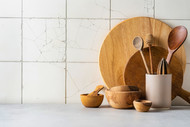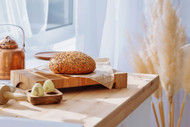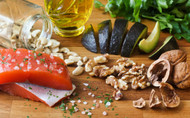
Food Safety and Butcher Block Countertops: What You Should Know
Jun 16th 2023
Food safety is essential for a healthy home. One key element of food safety is the kitchen countertop, as it is the primary interface between food and the environment. The choice of countertop material can greatly influence the safety and hygiene of your food. This is where butcher block countertops come in.
Butch block can provide unique food safety benefits while also offering aesthetic appeal. We’ll share important food safety factors related to kitchen countertops, the unique food safety benefits of butcher block countertops, and how to ensure your countertops remain food safe.
Kitchen Countertop Food Safety Factors
While they aren’t often thought of as such, your kitchen countertops are as vital as any other appliance you use to prepare food. In fact, counters are often the unsung hero of the kitchen. Food is prepped, served, and sometimes eaten from your counters. This means that food safety is an important consideration in your choice of countertop.
One of the most important countertop food safety considerations is the material’s permeability and ability to resist bacterial buildup. Porous materials, like certain natural stones and wood, can trap bacteria in their pores, potentially leading to food contamination.
Additionally, materials that are susceptible to knife damage, like wood and laminate, can also increase the opportunity for contamination by creating scratches or scuffs that harbor bacteria.
Fortunately, the potential challenges of wood counters are also their greatest strengths. With proper care and attention, butcher block can be a very safe food prep surface.
The Unique Food Safety Benefits of Butcher Block Countertops
Butcher block countertops have several characteristics that make them a food safe option:
Antimicrobial properties: Certain types of wood, like pine and oak, have been shown to possess natural antimicrobial properties that help kill bacteria, which can reduce the risk of foodborne illnesses. This is a significant benefit when compared to other materials, such as plastic or laminate surfaces.
Easy to sanitize with non-toxic cleaners: Butcher block countertops are relatively easy to clean and sanitize. Rather than using harmful chemicals, you can use natural cleaning methods such as diluted vinegar or a salt and lemon mix to keep the surface clean. This helps to maintain the surface without risking chemical contamination of your food.
Ability to be repaired: One of the advantages of butcher block countertops is that they can be repaired easily. If the countertop gets scuffed or damaged, light sanding and the use of mineral oil can help remove any stains or scuffs. This means you can maintain a clean, hygienic surface without needing to replace the entire countertop.
Remember, while butcher block countertops can be a food safe option, it's still crucial to maintain them properly. Regular cleaning and sanitizing are essential. Any damage should be repaired promptly to keep the surface hygienic for food preparation.
Ensuring Food Safety with Butcher Block Countertops
Maintaining the food safety benefits of butcher block countertops requires regular care and attention. Maintenance does not require special tools, or experience as much as straightforward, and observant upkeep.
Keeping Butcher Block Counters Clean
The first step to food safety is avoiding cross-contamination when possible. However, we know that isn’t always possible, so regular cleaning is vital to prevent bacteria from growing or spreading.
Fortunately, wood is relatively easy to clean. Properly finished wood can be wiped down with soap and warm water, and this will eliminate most harmful bacteria.
To make cleaning easier, be sure to apply mineral oil and wax to your wood counters as needed. This helps keep the wood grain hydrated and flexible. Doing so not only keeps your countertops looking great, but it prevents cracking, both visible and microscopic, that can create hiding spots for germs. Regularly waxing your wood countertops also makes them easier to clean by creating a thin, water-repellent barrier.
Repair Cuts and Gouges
Unlike other types of countertops, butch block offers a major advantage: it can be repaired. Wood is flexible, so it rarely breaks, but knives and other cooking utensils can score and wear down the surface. Like cracks, cuts, and gouges offer refuge for bacteria.
If your butcher block countertop becomes damaged or excessively worn, minor issues can be fixed with light sanding and the application of mineral oil. Sanding the counter down with increasingly higher-grit sandpaper will remove scratches, surface cuts, and smooth out gouges – eliminating areas to harbor bacteria.
Of course, the easiest way to repair damage is to prevent it from happening in the first place! So, save the chopping and heavy cutting for a food safe cutting board, and use countertops for light for prep.
Keep Your Counters Safe
Food safety in home kitchens is of paramount importance, and the type of countertop used can play a significant role in this. Butcher block countertops offer unique food safety benefits, but it is important to maintain them properly to ensure they remain safe and hygienic for food preparation.
By choosing high-quality products from companies like The Hardwood Lumber Company and following proper maintenance guidelines, you can enjoy the beauty and safety of a butcher block countertop in your home.
Remember, it's not just about having a beautiful kitchen; it's about having a safe and healthy one too.
Add a beautiful, food safe countertop to your kitchen and enjoy healthy meals with your entire family.




